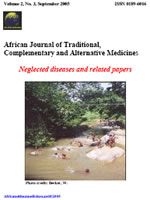
|
African Journal of Traditional, Complementary and Alternative Medicines
African Ethnomedicines Network
ISSN: 0189-6016
Vol. 12, No. 2, 2015, pp. 17-21
|
 Bioline Code: tc15022
Bioline Code: tc15022
Full paper language: English
Document type: Research Article
Document available free of charge
|
|
|
African Journal of Traditional, Complementary and Alternative Medicines, Vol. 12, No. 2, 2015, pp. 17-21
| en |
EFFECTIVENESS OF WET-CUPPING IN TREATMENT OF BALB/C MICE INFECTED BY LEISHMANIA MAJOR; PILOT RANDOMIZED TRIAL
Karaji, Ali Gorgin; Alipour, Hamid; Ahmadi, Alireza & Mohammadi, Reza
Abstract
Background: Cutaneous leishmaniasis (CL) caused by Leishmania major is common in Middle East countries. Most therapies are limited and
there is no effective vaccine for leishmaniasis. It has been reported that the ancient practice of wet cupping has been effective in treatment of
drug resistant CL in humans. The purpose of this present study was to evaluate the efficacy of wet-cupping in treatment of L. major infected
BALB/C mice.
Methods: We designed a randomized clinical trial using 12 male BALB/c mice, aged 8-10 weeks (six mice for each experimental and control
group). Each mouse was infected with L. major on the left hind footpad. Mice in the experimental group underwent wet-cupping once a week, up
to 6 weeks. The appearance of local reaction in the parasite inoculated paw was monitored and footpad thickness was measured for 7 weeks in
both groups. Then all mice were killed and their spleen and lymph node cells were cultured and the level of IFN- γ and IL-4 of cultured cells
supernatant were measured as the markers of TH1 and TH2, respectively.
Results: Lesion size thickness in the intervention mice seemed to grow faster than control ones. There were no significant differences in animal
weight, spleen and lymph node weight and total cell number. The level of INF-γ and IL-4 produced by spleen cells of intervention mice was not
significantly different from control mice(p=NS).
Conclusion: Our study showed that wet-cupping has no significant treatment effect on coetaneous leishmaniasis in BALB/c mice. Interestingly,
the disease was more severe in the intervention group.
Keywords
Leishmania; wet-cupping
|
| |
© Copyright 2015 - African Journal of Traditional, Complementary and Alternative Medicines
Alternative site location: http://journals.sfu.ca/africanem/index.php/ajtcam
|
|
